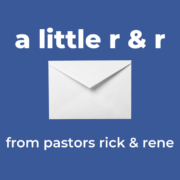a little r& r

Where were you on 9/11 when the Twin Towers in New York City and the Pentagon were attacked by Osama bin Laden’s Al Queda?
I’m sure we all remember where we were forty years ago when we learned a plane had attacked the North Tower only to be followed up by a second crash of a passenger jet into the South Tower along with the attack on the Pentagon and the crash of the jet in Shanksville, Pennsylvania.
I was mowing the front yard of our house in Omaha when René came running out to tell me a plane had crashed into the World Trade Center that fateful Tuesday morning. At first, I misunderstood, thinking it was a small plane. A few months earlier a small plane had crashed into an apartment building in New York City. But this made the videotaped crashing of the jet only more startling. Not long thereafter, as smoke billowed from the first tower, cameras showed the second plane crashing into the second tower.
For me, it had a similar impact to the moment I was between classes my sophomore year in high school when hallways were abuzz with the news President Kennedy had been shot and killed. Some moments are so terrible you just don’t forget them and where you were and what you were doing at the time. For those of us who were alive to see them, awful tragedies like 9/11 and the Kennedy Assassination are written indelibly upon our hearts and our memories.
Two weeks ago, René and I watched the TV special “Memory Box: Echoes of 9/11,” composed mostly of videotaped recordings of survivors of 9/11. The recordings were made in the Spring of 2002 soon after the tragedy and again with the same survivors 20 years later. In both sets of tapes, the survivors spoke of their immediate response & 20 years later how their lives had been shaped by 911 in the intervening years.
It’s well-worth the two-hour investment of time listening to their stories, though it isn’t easy to watch. Your heart can’t help but ache for the persons making the recordings, nearly all of whom lost best friends and loved ones. Your heart breaks for those who died within moments of the planes crashing into the buildings and when the World Trade Center skyscrapers and one-wing of the Pentagon came tumbling down. Your heart sinks for those First Responders rushing in to help as many people as they could, only to die a few moments later or from cancer years later due to their exposure to the toxic ash filling all of Lower Manhattan that day.
9/11 came as close as any such a tragedy in approximating Hell on earth. Some rightly believe that, despite all Americans coming together immediately after 9/11, the tragedy helped catalyze the paralyzing polarization we’re all experiencing in our country today. The U.S. also received the condolences of nations across the earth, though the second Iraq War changed this.
But listening to the survivors of 9/11, including the families who lost loved ones in Shanksville, served to underscore two takeaways from that and other losses we have all experienced in our lives. Both of these takeaways are positive:
First, even as the survivors shared their pain and the haunting questions that plagued them—one woman telling of her “survivor’s guilt” since she was able to make it to safety when so many of her co-workers did not—they all attested that while they know they will never get over their horrifying memories of being there on 9/11, they have gotten through their grief. Those dreadful moments put into deeper perspective for them what they hold as most precious in their lives: their closest relationships.
A widower spoke of losing his wife at the Pentagon and how overwhelmed he felt at first knowing he would have to rear his young son and daughter alone. The evidence of the difference his and his deceased wife’s love for them made unfolded as his son years later graduated from Harvard and his daughter launched out in a respected professional career. Though his wife wasn’t there to behold her children’s success, her surviving husband said he could see the imprint her life had made on them. People really do get through their grief without discarding the memories, mostly good, but, yes, some bad.
The second positive takeaway is the revelation that resurrection really happens to ordinary people, however devastated their lives became for a while. Spiritual transformations were universal among all the survivors. A commercial airline pilot and a Navy Reservist told of being called up soon after 9/11, to serve in Iraq. He went most reluctantly under orders and initially isolated himself from others because of his scars from that terrible day.
But then he discovered how warm and caring everyone was toward him and one another. His life was transformed while in Iraq by people from that part of the world, who embraced him as a brother and as a friend. He returned home after his stint in Iraq and, like many other survivors, dedicated himself to his community and making others’ lives better.
Can we, under the weight of whatever grief lies heavy on our hearts, be transformed too? Is there a symbolic 9/11, or even the actual 9/11, causing us grief and pain? Is there really a message of resurrection awaiting our hearing and embrace?
Though geophysical in nature, but not as broadly and humanly tragic, another day is etched in René’s and my memory. It was May 18, 1980. It was our daughter Erica’s second birthday. It was also the day Mt. St. Helens in southwest Washington State, erupted and killed 57 people, including a cantankerous old man named Harry Randall Truman (obviously not the president) and a vulcanologist named David A. Johnston.
The Johnston Visitor Center, 3 miles from the cone of the mountain, is named after him. Johnston took his position to observe & study Mt. St. Helen’s eruption only to be killed by the vaporizing speed and heat of its eruption, toppling and killing everything and everyone in a 4- mile radius from the volcano’s epicenter. Ash up to 6 to 12 inches deep completely covered much of northern Oregon and all of eastern Washington as the plume reached thousands of feet high.
Twenty-five years later in the summer of 2005 René and I visited Mt. St. Helens. We toured the Johnston Center and hiked some of the trails within a mile or so of the volcano, now mostly dormant but safe to approach. We discovered alder trees, often among the first species to grow in a devastated area, growing and multiplying. They and other vegetation grew along rivulets left by the eruption. We also hiked around Spirit Lake near the volcano’s core. Naturalists believed the lake had died, only to discover to their amazement that the lake and new fish had made a comeback!
René and I were captured by the miracle before our eyes and beneath our feet.
In March 2018 we returned to Mt. St. Helens, where spruce and pine trees now fill the once deadened valley below. If we hadn’t known to look for the crater, Mt. St. Helens today would look like just any other mountain. But it isn’t. It is a miracle of God’s re-creative abilities.
So, whenever we are tempted to give into death without the promise of resurrection and wherever we are tempted to despair of the future without the hope of the new thing God may be doing, may we remember 9/11’s undaunted survivors, a volcano that took life but is in the long term giving even more life back, and our church, where God’s Spirit continues to whisper our names and whose fire never goes out. For then we will be well, and all will be well!
Even in this season of loss and confusion
Christ is Risen! He is risen indeed!
Rick



